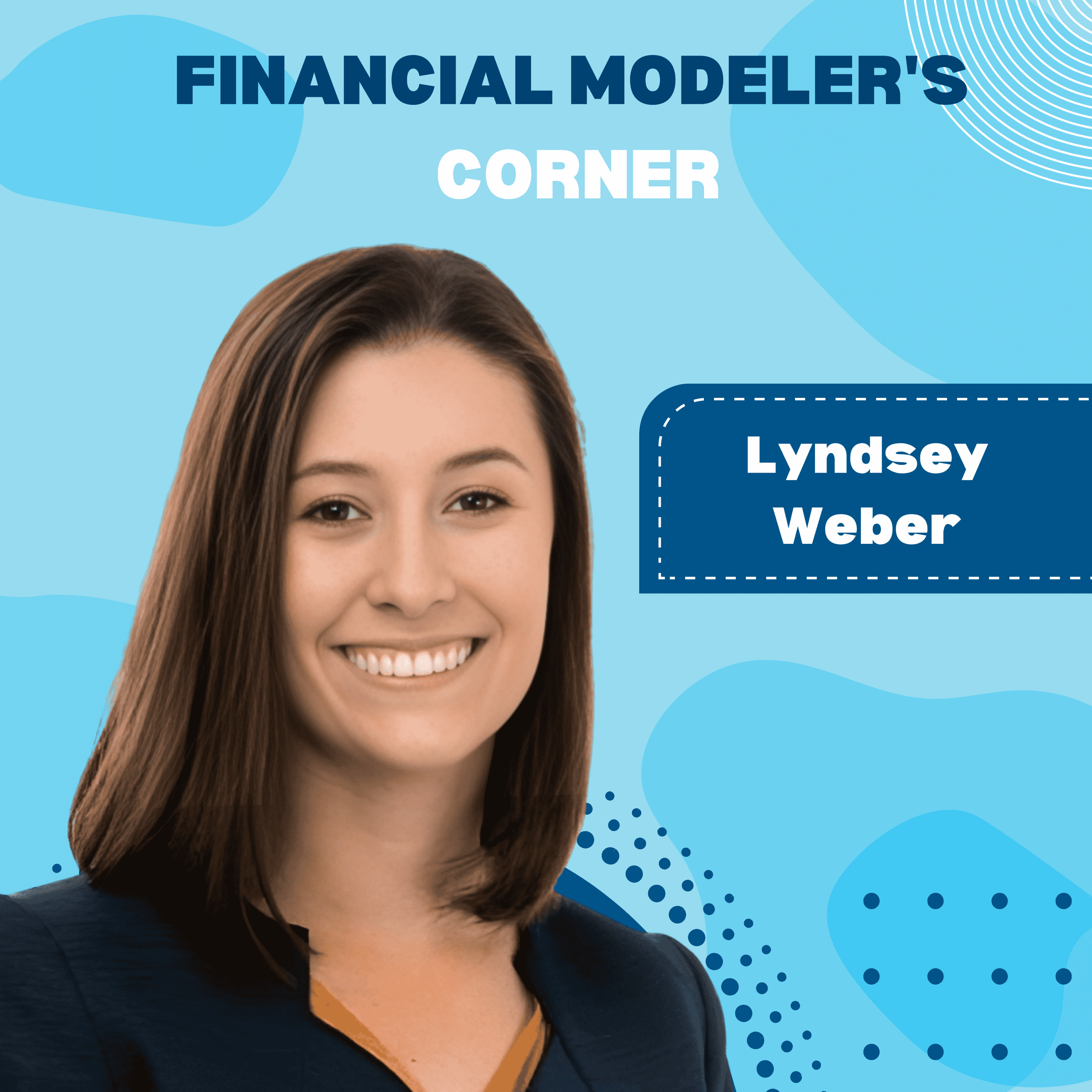
Quantrix vs. Excel - Financial Modeling
Lyndsey Weber, a seasoned expert in financial and supply chain modeling join us this week for a lively conversatio on both financial and supply chain modeling. She recounts her experience with some of the worst models she has encountered, the lessons learned, and the importance of organization and design in creating effective models. Lyndsey shares her journey from ExxonMobil to Quantrix, offering a deep dive into the art and science of financial modeling.
Key takeaways from this week's episode include:
Having a well-defined structure and approach is crucial for creating and maintaining effective financial models. Poorly organized models can lead to significant challenges and inefficiencies.
A horror story about inheriting a model filled with bad practices, including hidden reference cells and broken VBA code. The experience teaches her the value of starting over and building a model from scratch with best practices.
The importance of understanding stakeholder needs, both emotional and practical, and designing models that cater to these needs. This approach helps in building models that are not only functional but also user-friendly.
The benefits of using Quantrix over traditional Excel, highlighting features like always-on pivoting, natural language formulas, and role-based access, which enhance efficiency and collaboration.
One of Lyndsey's key pieces of advice is to prototype models on paper before building them. Mapping out inputs, outputs, and key calculations in plain English helps in creating a clear and effective model structure.
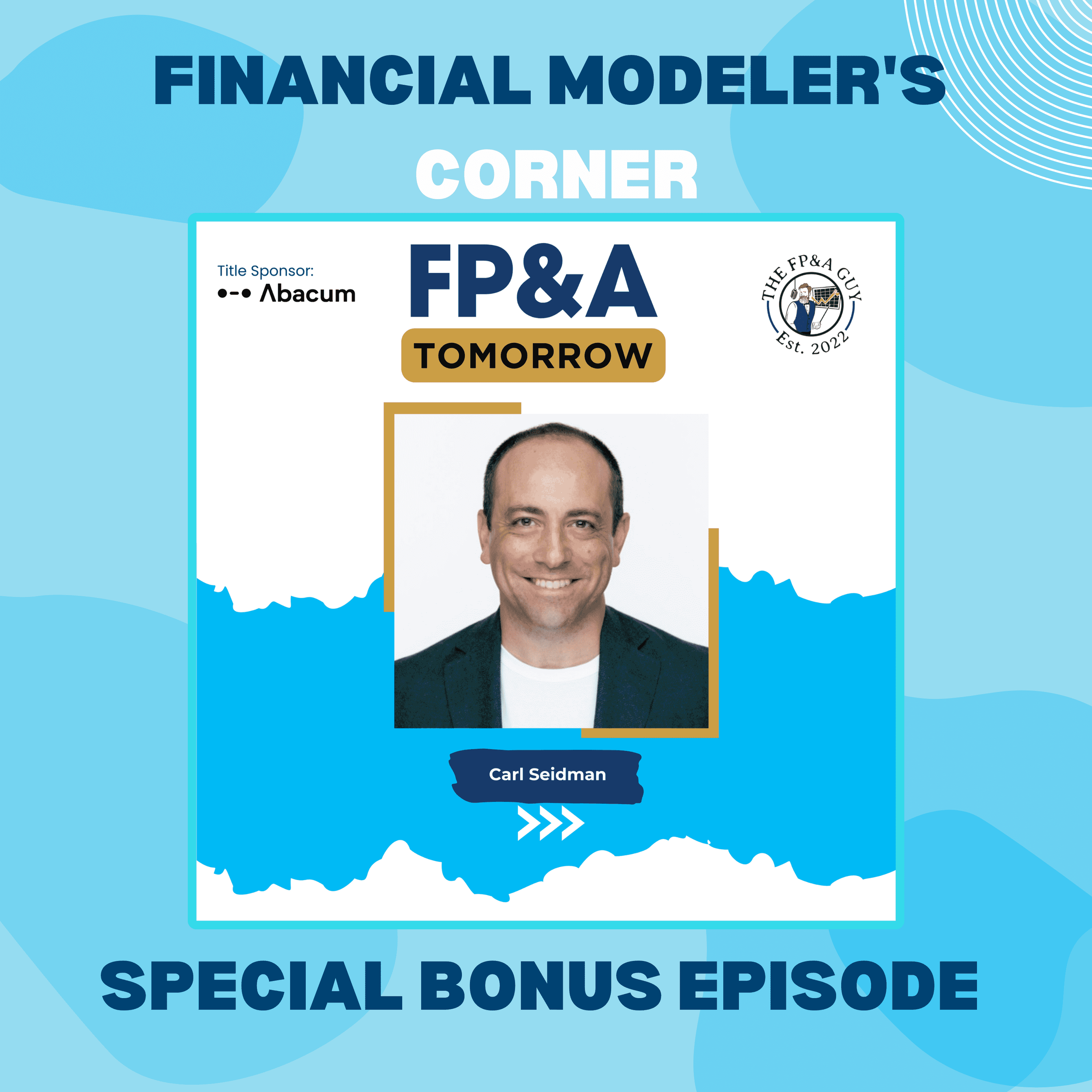
The Importance of Predicting and Influencing in FP&A
In today’s episode, Paul engages in a conversation with Carl Seidman to discuss why mastering presentation skills, and understanding the needs of the audience is crucial for excelling in your FP&A career.
Carl is a premier FP&A and Fractional CFO expert, providing financial advisory and leadership development services to top companies including Deloitte, Verizon, and Walmart. Carl is known for his impactful training programs and advisory work that drive success in financial planning and analysis.
Key takeaways from this week's episode include: :
Here is a concise summary of the key points from the discussion:
In FP&A, the ability to distill complex information into a concise, impactful message is paramount. It's not about how much you know, but what you can communicate effectively.
The ability to distill complex information into a concise, impactful message is paramount. It's not about how much you know, but what you can communicate effectively.
FP&A isn't just about numbers, it's about storytelling with data, painting a vivid picture of the financial landscape that guides strategic decisions and drives organizational success
Anticipating potential disruptions or changes in the business environment is a fundamental aspect of FP&A. By identifying risks and developing strategies to mitigate them, FP&A professionals can help the organization stay ahead and adapt effectively.
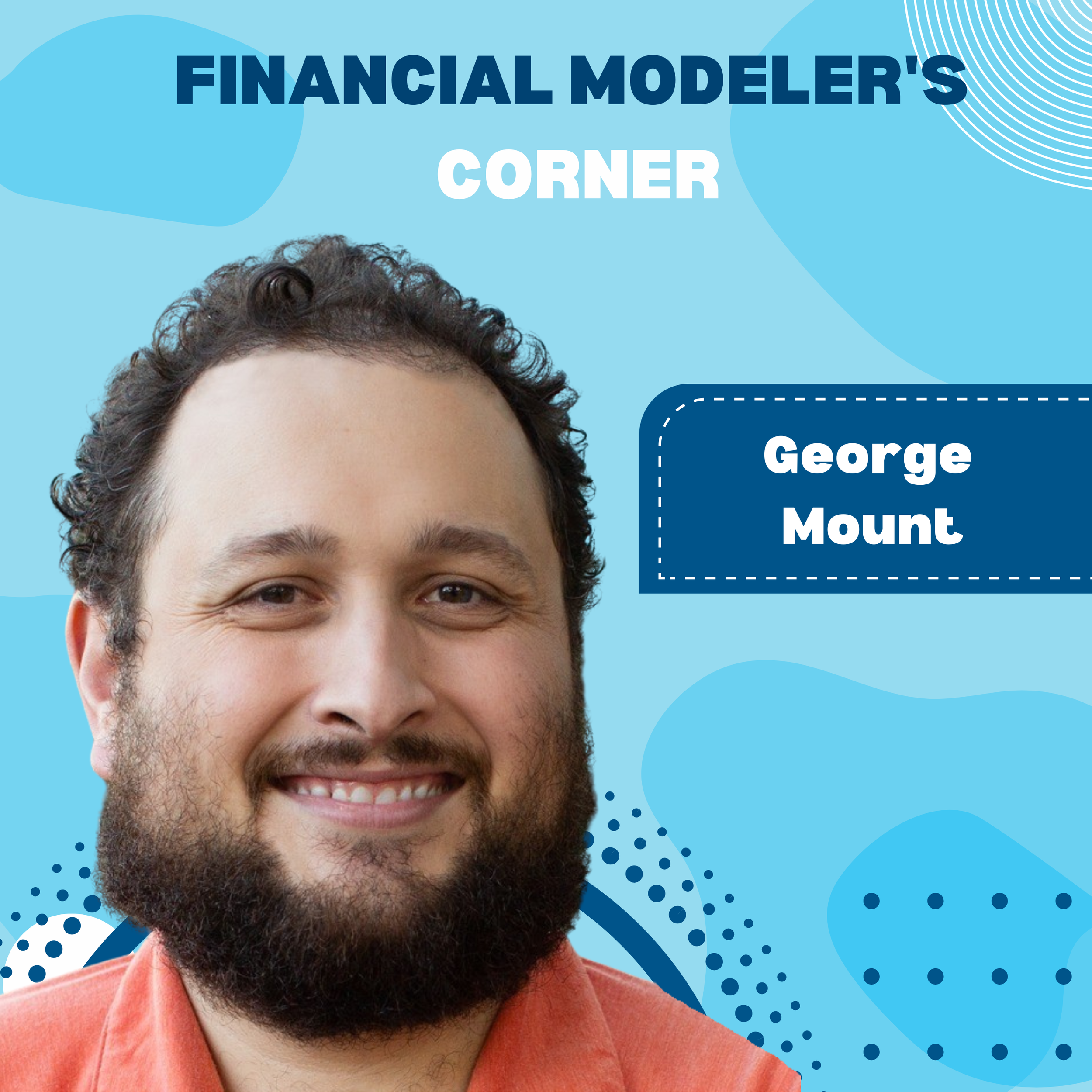
The Future of Financial Modeling
In this episode, expect to learn:
Excel's flexibility is both its greatest strength and weakness. While it allows for complex modeling, this same flexibility can lead to chaotic and error-prone spreadsheets if not managed properly.
Today's Excel is vastly different from the Excel of a decade ago. With features like Dynamic Arrays, Power Query, and the integration of Python, Excel has become a powerful tool for modern data analysis and financial modeling.
Python’s capabilities in handling time series analysis, data visualization, and complex computations complement Excel’s functionalities, making it a valuable skill for modelers.
Excel excels in prototyping and wireframing due to its immediate data visibility and user-friendly interface. This makes it ideal for quickly iterating models and understanding data before moving on to more complex tools when necessary.
George shares advice on how to get started learning Python and other analytical tools to take your analysis and modeling to new heights.
A core principle for George is the importance of sharing what you know about Excel and data analytics. He emphasizes building a culture of knowledge sharing to foster growth and efficiency within teams.

Innovative Approaches to Financial Modeling and Risk Management
In this episode, expect to learn:
Raphael emphasizes the critical need for regular audits of financial models to prevent errors and ensure accuracy. He shares a horror story about a model that wasn't audited for five years, leading to significant financial discrepancies.
While Excel is known for its flexibility, Raphael discusses the trade-offs of using more structured tools like Causal, which can help reduce errors and provide more insightful analysis through its object-oriented approach and natural language variables.
The importance of integrating operational data with financial models to provide actionable insights. He stresses that understanding business operations is crucial for building effective and useful models.
Raphael shares his journey from using traditional Excel spreadsheets to adopting Causal, a modern financial modeling tool. He explains how Causal's dynamic dashboarding, probability distribution modeling, and seamless integration with other systems offer significant advantages over Excel.
The discussion focuses on the potential of AI in financial modeling, Raphael notes that while AI can build models, the real question is whether it should. He also touches on the importance of human judgment and expertise in interpreting and using these models effectively.
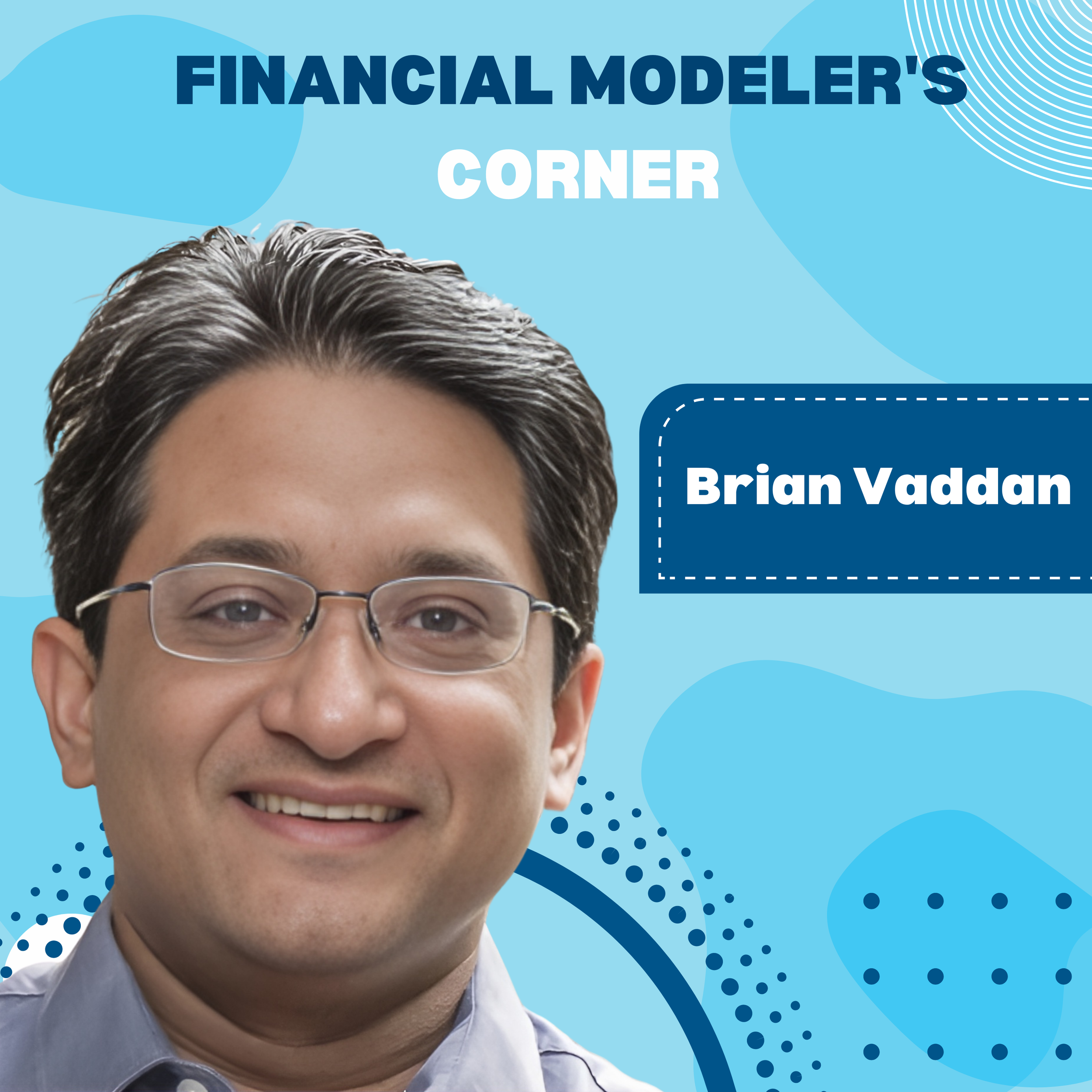
Building Structured Financial Models from Chaos
In this episode, expect to learn:
A distinction between those who use spreadsheets casually and those who build models as a core discipline. He emphasizes the importance of creating models that are understandable and usable by others, akin to the difference between a sketch artist and an architect.
Intellectual curiosity, an almost obsessive desire to solve problems, and the ability to bring structure out of chaos are highlighted as key traits for successful financial modelers. Brian stresses that these traits are more critical than technical skills alone.
One of the profound insights shared is the importance of simplifying complex problems. Brian believes that the true measure of a modeler’s intellect is their ability to present complex ideas in a straightforward and understandable manner.
Financial modeling is described as a deeply creative exercise. Brian compares it to art, where each model reflects the modeler’s thought process and experiences, much like an artist’s painting.
Brian shares his experience transitioning from being a modeler to managing a team. He discusses the challenges of letting go and empowering others, and the iterative learning process involved in both building and reviewing models.

Discovering New Dimensions In Accounting
Welcome to a special episode of our podcast! Today, we're thrilled to bring you an exciting Podswap. Stay tuned for an engaging conversation you won't want to miss. Here are the show notes from our previous episodes.
Prepare to be captivated as hosts Paul Barnhurst and Glenn Hopper welcome Sasha Orloff, CEO of Puzzle, to uncover the technological advancements reshaping the world of finance and accounting. In this eye-opening episode, you'll discover:
- How generative AI is seamlessly integrating into everyday software, automating tasks and delivering data-driven insights.
- The rise of "AI agents" in 2024 - advanced systems designed to autonomously process complex problems and provide tailored solutions.
- Sasha's visionary project, Puzzle, modernizing accounting software with real-time, flexible financial data processing.
- The transformative potential of blockchain technology to enhance transparency and traceability of financial transactions.
- The future of finance reimagined through AI and predictive analytics, empowering more precise forecasting and strategic decision-making.

Secrets to Building Error-Free Financial Models
In this episode, expect to learn:
Use dynamic arrays to reduce the number of formulas and potential error points. Clearly separate inputs, calculations, and outputs into distinct sheets. This enhances clarity and ease of use.
Ensure uniform column and row structures across sheets. This consistency minimizes errors and simplifies formula management, making models easier to audit and understand.
Mixing traditional Excel formulas with dynamic arrays reduces the benefits. A complete commitment ensures better performance and error reduction.
Using graphs and charts helps quickly identify trends and anomalies, making it easier to ensure realistic assumptions and accurate models.
Establishes a solid foundation, ensuring you learn best practices early on, which prevents the development of bad habits and enhances overall modeling skills.
Implementing dynamic arrays can drastically reduce the file size and complexity of models, making them more efficient and manageable.
Issues like mixed calculations and unrealistic assumptions emphasize the importance of thorough checks and realistic inputs in financial modeling.

Golden Rules to Prevent Excel Disasters in Financial Modeling
In this episode, expect to learn:
Organize workbooks with clear, logical structures. Separate inputs, calculations, and outputs into distinct sheets. Use consistent naming conventions and separator sheets to enhance clarity and ease of use.
Maintaining a consistent design throughout the workbook. Use uniform column and row structures across sheets. Consistency minimizes errors and simplifies formula management, making models easier to audit and understand.
Formal training in financial modeling is crucial. It establishes a solid foundation, ensuring you learn best practices early on, which prevents the development of bad habits and enhances overall modeling skills.
Real-life horror stories highlight common errors, such as improper data copying and pasting. Ensuring consistent data formats and understanding the intricacies of your calculations are essential to avoid costly mistakes.
Use Macros for repetitive tasks like generating output sheets, not for complex calculations. They help automate processes and reduce manual errors but should be applied judiciously to maintain model integrity.
Implement data validation to restrict inputs. This minimizes user errors by ensuring only valid data entries are made, such as positive numbers or specific date ranges, enhancing the reliability of your models.
Regularly test models to ensure accuracy. Use master check sheets to consolidate checks and quickly identify errors. This proactive approach helps maintain the model’s integrity and reliability over time.

Unlocking Financial Model Secrets and Advanced Techniques
In this episode, expect to learn:
An early career encounter with a poorly designed financial model, filled with hard-coded numbers, underscores the necessity for creating flexible and dynamic financial models that can adapt to changing business needs.
The discussion highlights the critical need to avoid hardcoded data and external links in financial models, which can lead to rigidity and errors.
Insights from the financial modeling newsletter and courses show a wide range of professionals benefiting, from newcomers to seasoned directors. This variety demonstrates the widespread need for improved modeling skills.
The discussion focuses on the importance of transforming data into actionable insights. It's stressed that without the ability to analyze and interpret data effectively, its value is minimal.
The conversation sheds light on techniques for deriving actionable insights from complex data, crucial for any financial modeler. It also discusses the value of formal certifications like the Advanced Financial Modeler Certification as tools for professional development and skill validation.

Financial Modeling Techniques for Global FP&A Success
In this episode, expect to learn:
An early career encounter with a poorly designed financial model, filled with hard-coded numbers, underscores the necessity for creating flexible and dynamic financial models that can adapt to changing business needs.
The discussion highlights the critical need to avoid hardcoded data and external links in financial models, which can lead to rigidity and errors.
Insights from the financial modeling newsletter and courses show a wide range of professionals benefiting, from newcomers to seasoned directors. This variety demonstrates the widespread need for improved modeling skills.
The discussion focuses on the importance of transforming data into actionable insights. It's stressed that without the ability to analyze and interpret data effectively, its value is minimal.
The conversation sheds light on techniques for deriving actionable insights from complex data, crucial for any financial modeler. It also discusses the value of formal certifications like the Advanced Financial Modeler Certification as tools for professional development and skill validation.

Embracing Skepticism To Enhance Financial Modeling Techniques
In this episode, expect to learn:
An unconventional entry into investment banking at 43, highlighting how the background in education enriches the approach to financial analysis and modeling, emphasizing the crossover skills between teaching and financial analysis.
This highlights how teaching skills are transferable and beneficial in the financial analysis and modeling sectors.
An anecdote about a significant error in a financial model, which failed to detect a $29 billion discrepancy, underscoring the critical importance of rigorous validation and diagnostic checks in financial modeling.
The role of behavioral factors in financial modeling, adopting a stance of professional skepticism and the need for understanding and questioning the assumptions underlying a model before trusting its output.
The importance of simplicity and planning in financial modeling, the most effective models are those that are straightforward, well-planned, and can communicate complex financial insights in an accessible manner.
Strategies for mitigating bias, such as incorporating different perspectives and rigorous testing of hypotheses

How Simplicity in Financial Modeling Enhances Decision Making
In this episode, expect to learn:
The significance of technical skills, such as financial modeling, accounting, and Excel proficiency, in the finance industry
How specialized training programs can help individuals enhance their financial knowledge and technical abilities
The evolving role of AI in finance and how it complements human expertise rather than replacing it
The balance between technical proficiency and interpersonal skills to excel in their careers
How individuals can build trust with clients, colleagues, and stakeholders, ultimately contributing to the integrity and credibility of the finance profession.

Unraveling the Mystery: Roderick Mckinley's Guide to Navigating Tokenomics
In this episode, expect to learn:
Understand the integration of finance, blockchain, Tokenomics, and strategic guidance for blockchain projects.
Gain insights into challenges and opportunities in transitioning from traditional finance to the crypto space.
Learn how to navigate complexities like token volatility and incentive alignment in blockchain projects.
Obtain practical tips on developing tokenized business models, designing token utilities, and structuring token allocations for successful fundraising.
Acquire valuable knowledge for navigating the evolving landscape of blockchain and cryptocurrency.

Shaping Business Strategy: Ian Bennett's Insights on What Makes for a Great Financial Modeler
In this episode, expect to learn:
Why understanding the stakeholders involved in a project is vital
Why it's essential to listen actively to clients, understand their needs, and ask the right questions
How to analyze the success and effectiveness of the financial modeling process
What are the tools and technologies available in the market
What are the new technologies and methodologies for financial modelers to stay effective and successful in their roles

Mastering SaaS Models: Derek Baker's insights on building robust SaaS models
Listen to this episode as Derek shares:
How he got into financial modeling for SaaS companies
His advice for building robust SaaS Models.
The importance of understanding a business to build better Models.
Everything about SaaS and SaaS Companies.
His position on controversial modeling issues, including circular references, dynamic arrays, modeling standards, AI in modeling, and more.

Beyond the Numbers: Lance Rubin's Insights on AI, Power BI, and the Future of Financial Modeling
Listen to this episode as Lance shares:
His learning from the worst models he has come across.
His journey into Financial Modeling and how he fell in love with modeling.
The key to Financial Transformations.
The HACK Framework.
The importance of Power BI and similar tech.
His advice on the use of tools and shortcuts.
His position on controversial modeling issues, including circular references, dynamic arrays, modeling standards, AI in modeling, and more.

Beyond the Classroom: Why Learning Excel is an Investment for Your Career
In this episode, we have another special treat for you which is part two of the Financial Modeling World Cup (FMWC) and the Microsoft Excel Collegiate Challenge (MECC). Paul attended modeling competitions in Arizona and Las Vegas watching competitors compete and talking to the commentators, spectators, and faculty, and we have brought you a few of those interviews.
Listen to this episode as:
Andrew Ngai shares how amazing it was to look out at the facility, the HyperX arena in Vegas, and realize that this was his hobby.
The founder of FMWC, Andrew Grigolyunovich talks about how it fulfilled a dream of his to talk about that.
Competitors share why learning excel is so important for your career.
The students share some of their experiences, favorite Excel formulas and why they're such big fans of Excel and financial modeling.

Episode 18 - From Campus to Spreadsheet: The Microsoft Excel Collegiate Challenge Journey
In this episode, we have a special treat for you with multiple guests who attended the Microsoft Excel Collegiate Challenge (MECC). At the beginning of November, Paul had the opportunity to spend a day at the University of Arizona campus and watch these students compete and talk to commentators, spectators, competitors, and faculty, and we have brought you a few of those interviews.
Listen to this episode as:
Excel MVPs, Oz Du Soleil and Jon Acampora share why they attended the show, what they love about the competition, and the magic of Power Query.
The host of this competition, Prof David Brown talks about MECC.
The e winner, Patrick Chatain and 3rd-place finisher Benjamin Weber share their experiences.
Missy and Teresa from Salve Regina University, talk about why they started with Excel as they were building out a data analytics business program.
Craig Hatmaker shares everything about 5G Lambdas and more.

Episode 17: Precision in Modeling: Sam Sivarajan’s Wisdom on Balancing Art, Science, and Decision-Making
In this episode, Paul Barnhurst is joined by Sam Sivarajan, who is a Speaker, Wealth Management Consultant, Behavioral Scientist, Stoicism Padawan, Fintech Advisor, Podcast Host, Bestselling Author and an Adventurer. He has a law degree, an MBA, a PhD in behavioral science, and has also earned a CFP.
Sam’s work is focused on how we can make better decisions so that we can get to better results – in investing, in leadership, and in our personal lives.
Listen to this episode as Sam shares:
· His journey working in Telecom during the tech boom.
· Advice on balancing the art and science of Modeling.
· His advice on making smart assumptions.
· The importance of Decision Making.
· How to think critically when building a model and making assumptions.
· Everything about his books ‘Making your money work’, ‘Uphill’ and ‘Am I Ok?’.
· His position on controversial modeling issues, including circular references, dynamic arrays, modeling standards, AI in modeling, and more.
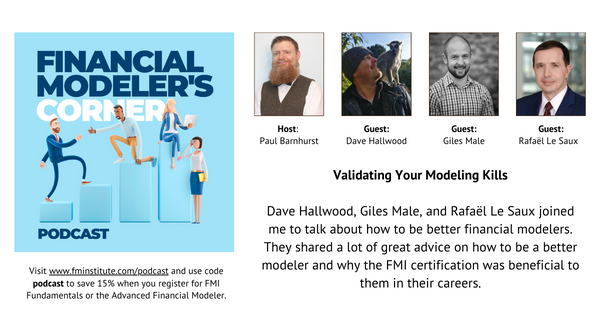
Episode 16: Dave Hallwood, Giles Male, and Rafaël Le Saux Explore Being a Better Financial Modeler and Financial Modeling Certifications
In this LinkedIn Live, Paul Barnhurst is joined by three amazing Modelers, Dave Hallwood, Giles Male and Rafa ë l Le Saux.
David Hallwood FCCA is the Group Finance Director at Aldrich Group Ltd . He is a Chartered Certified Accountant, Commercially minded with a background in Accounting and Business in SMEs Dave took the AFM last year and the CFM this year.
Giles Male is a co-founder of Full Stack Modeller - an award-winning training program and community for Modelers at every level, with an opportunity to gain Full Stack Modeler accreditation. He will also be taking on a limited number of coaching clients in 2024. Giles took his AFM 2 years ago and is awaiting the result of CFM.
Rafaël Le Saux, CFA, CAIA, CFM, ABV, FMVA is a Director and Valuation & Modeling Advisory Lead at PwC Luxembourg / LVPA Board Member. He is passionate about Valuation and Modeling disciplines and has piloted his professional path toward amassing sufficient knowledge to support clients in solving complex valuation problems across different asset classes, industries, and geographies.
Listen to this episode as the guests talk about:
Their experiences in Modeling.
The value of Financial Modeling Accreditation.
How to improve your Financial Modeling skills
Their position on controversial modeling issues, including circular references, dynamic arrays, modeling standards, AI in modeling, and more.
